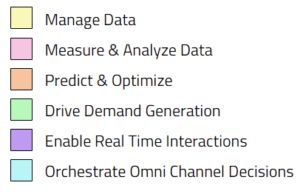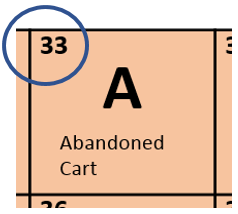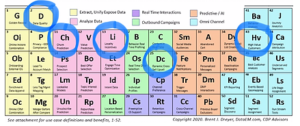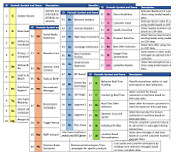CDP Periodic Table
June 29, 2020When people are introduced to a new technology, they typically ask, “What is this?” So, the answer they get is a definition. For example, a CDP (Customer Data Platform) is a marketing technology that can ingest customer data from any source, create unified customer profiles (Golden Records), model behavior, and share that data with any source that needs it.
But what they really mean to ask is, “What can this technology do for me?” The CDP Periodic Table answers that question by listing categorized examples (elements) of use. The elements are the titles of Use Cases that are often cited as requirements for a CDP.
The elements are categorized by general CDP objectives, and they are the foundation for asking the most important questions:
- How do I grow my business with a CDP?
- How do I make money with a CDP?
- How do I beat the competition with a CDP?
The answers are in the elements, categorized by color:

 |
Each element has a number in the upper left corner. This corresponds to the definition and benefits that have been summarized on a separate page. |
| To access the definitions and benefits, click anywhere on the CDP Periodic Table, or click on the definition’s icon.
|
|
 |
|
 |
To return to the Periodic Table from the definitions and benefits page, click on the icon that says, “Click to CDP Periodic Table”. See the example to the left. |
Using the CDP Periodic Table when Interviewing Vendors
Step 1. Review the various elements, look up the definitions and benefits.
Step 2. Print the table and circle the desired features in your marketing system.

Step 3. Use your selected elements as examples of requirements when talking to CDP vendors.
While it is a good start to know your basic requirements, there are other considerations that should be documented before approaching vendors. These include a summary of your marketing channels, marketing priorities (e.g. awareness, acquisition, customer value, retention, expense reductions, etc.), as well as your budget and industry focus. You will also need to complete a review of your existing marketing technology (e.g. Gap analysis) so that you are not overlapping existing technology.
All these details will widen or narrow the list of candidates when interviewing your prospective vendors. Ultimately, the requirements will make their way into an RFP (Request for Proposal).
If this sounds like a lot of work, it can be. Aside from the requirements documentation, it can be an enormous task to research prospective vendors and weed through their bloated marketing collateral. Subsequent hours of phone calls, meetings, demonstrations will cull the group of vendors down to those that have, and can, address your specific needs.
Another Way
The CDP Institute has created a tool that will provide you a list of top matching vendors, as well as a draft of your requirements in an RFP. Literally, taking a 15-minute survey can save you weeks of work. [See our article, “CDP Journey- Finding a Vendor”.]
This service is currently offered for FREE by the CDP Institute and is accessible on Google Forms page at https://bit.ly/CDPInstitute. During the month of July 2020, the CDP Institute is offering 30 minutes of FREE, vendor-neutral advice from one of the Institute’s expert consultants.
The Easier Way
Call the CDP advisors at DataEM to discuss your specific goals. 954.906.2590
DataEM is a Customer Data Platform (CDP) consultancy. A CDP can ingest customer data from any source, create unified customer profiles (Golden Records), model behavior, and share that data with any source that needs it. Brent Dreyer is the Managing Partner at DataEM, and one of the expert CDP consultants assisting the CDP Institute with their vendor-neutral advisory services.



